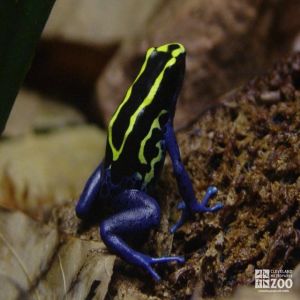Yellow-and-Blue Poison Dart Frog
[Dendrobates tinctorius]

Also known as the Dyeing Dart Frog, the Yellow and Blue Poison Dart Frog has a slim body with a rounded snout. Yellow and Blue Poison Dart Frogs have slender legs with toes and fingers having small adhesive discs for climbing. It is the largest of the family and is over two inches long. It has no teeth. Its color, black with brilliant yellow stripes and a blue belly and legs with black spots, alerts potential predators that its skin holds a poisonous liquid which is unpleasant to the taste. They may also be colored brown-black with yellow and white stripes depending on the area where they are found.
Location: Animals Formerly at Zoo
Share:
Range
The range of the Yellow and Blue Poison Dart Frog is South America: French Guiana, Guyana, Surinam and Northeastern Brazil.
Habitat
Yellow and Blue Poison Dart Frogs inhabit rain forests in cracks or clefts of tree trunks sometimes 30 feet above the ground and near a stream.
Conservation Status
Least ConcernPrimary Threats
Gestation
Incubation: 2 weeks
Litter
Clutch size: 5 to 20 eggs
Behavior
Yellow and Blue Poison Dart Frogs are active during the day, foraging in the leaf litter for their food. They move in short hops and are rarely still for more than a few moments. They are territorial and will dispute their territory by having “wrestling matches.”
Reproduction
In Yellow and Blue Poison Dart Frogs, mating is done by amplexus in which the male clasps the female while she lays her 5 to 20 eggs. He fertilizes these immediately after they are expelled before the jelly which surrounds them swells. All eggs are laid on the ground and are guarded by the parents until they become larvae. The male then attaches the larvae to his back by a mucous secretion and carries them to a stream. They develop into tadpoles and eventually into frogs by metamorphosis.
Wild Diet
Ants, termites and other small arthropods (spiders, insects)
Zoo Diet
Fruit flies and crickets
